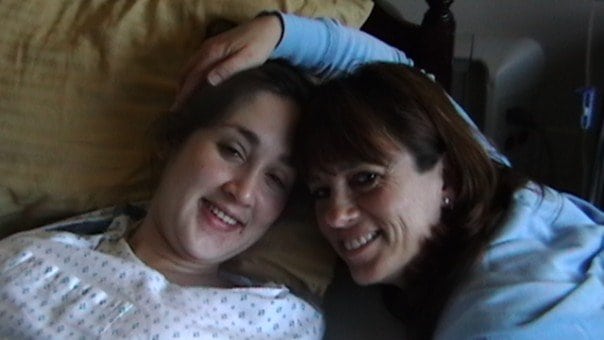For most mothers, pregnancy is a time of joy and anticipation. However, for a small percentage (most experts estimate 5 – 10%), pregnancy is a time wrought with worry and fear. These women are, for varying reasons, in the “high risk” category, meaning that there is something that could potentially go wrong with them or their baby. Women may fall into this category because they have a chronic health condition, because they are very overweight, because of family history of pregnancy complications, because of carrying multiple babies, or because some problem with the baby presents itself early on.
When a woman is high risk, it means that she will be scrutinized heavily throughout her pregnancy in order to keep herself and her baby safe. She will have many doctor’s visits and extra tests to ensure safety. The nature of the problem will determine the course, but today we’ll talk about some of the things that may happen.
You will have a lot of extra tests
Exactly what tests will be determined by the reason for being high risk. If for example, you have a family history of genetic illness, you will probably be subject to a quad screen (blood test) to check for your risk, undergo genetic counseling (if you haven’t already), and have an amniocentesis. If it is determined that something is wrong with the baby, then further testing to determine how severe it is may be warranted.
Or, if you are diabetic, your doctor will be monitoring your blood sugar very closely and will probably do several ultrasounds to check on the size of the baby, as babies born to diabetics tend to be on the large side.
Make sure to ask your doctor upfront what tests he feels are necessary to keep you and your baby safe, so that you can plan and prepare as necessary.
You will have a lot of ultrasounds
It seems that no matter what the problem is, ultrasounds are used more frequently in high-risk pregnancies because they can tell some things about how the baby is doing. Most often they are used to check on the baby’s growth, to make sure that it is within a particular window. A baby that is much smaller or larger than normal is cause for concern and may lead to early induction or even c-sections. Some doctors will perform ultrasounds as often as every week in the last trimester.
You will see your doctor a lot more often
While most women see their doctors monthly, then bi-weekly in the third trimester, and weekly only in the final month of pregnancy, high-risk women will see their doctors much more frequently than this. Some will their doctors bi-weekly from the beginning. Others will start weekly visits in the second or early third trimester. Some women may even see their doctors multiple times a week in the last couple months of pregnancy. Frequency varies greatly from woman to woman, depending on the situation. However, visits will be more frequent than is typical.
Ask your doctor what a typical visit schedule might look like for someone with your situation; however, don’t be surprised if he can’t answer completely. How often you visit your doctor later in pregnancy may depend on whether or not additional complications develop later in pregnancy.
You may see a maternal-fetal medicine specialist
In addition to seeing your regular doctor, you may also see a specialist in maternal-fetal medicine, who only sees high-risk women. You may see this specialist only a few times if you have “risk factors” but no problems develop; you may see the specialist as often as your regular doctor or even only see the specialist if your case requires it. Ask your doctor early on if you will need to see a specialist and what you might be able to expect, but again, it will depend on if complications develop later.
Your doctor may be more free with the medications
Even doctors that are usually pretty medication-happy understand that there are certain, potentially serious risks involved with taking anything during pregnancy. But when you are high risk, your doctor is more likely to believe that the risks of not taking the medication outweigh the risks of taking it.
If for example, you are diabetic and need something to control your blood sugar (or risk diabetic coma and serious damage or death to you or baby), you’ll need to keep taking it — even if there are risks of birth defects. The same goes if you suffer from epilepsy. And it may even be true if you’re suffering severe morning sickness, develop high blood pressure, etc. Your doctor is being extremely cautious and wants to make sure that any issues are controlled before they can cause damage to the baby, and in certain cases, medication may be the way.
It is crucial, however, to make sure you trust your doctor, so that there is no issue with the doctor simply being overly cautious and recommending medication just because you are high risk, and not because there is an immediate threat. Make sure your doctor discusses all the options with you thoroughly and that you understand the risk-benefit situation and are fully informed before accepting any medication.
You will likely have non-stress tests frequently at the end
A non-stress test tells if your baby is doing well or is under stress that could, over time, cause him/her harm. A non-stress test basically means that you will sit in bed for 20 to 30 minutes with a heart rate monitor and a contraction monitor strapped to your belly. Your baby’s heart rate will be monitored for change. This may be done routinely if there is a concern; or it may be used if your baby is not moving often enough. Occasionally babies may be sleeping and moms will be asked to move around or drink sweet juice to try to wake the baby.
You may be put on bed rest, and/or have your activity restricted
Depending on your circumstances, you may have your activity restricted or even be placed on bed rest. We’ll talk more about this in an upcoming post (because bed rest is really a topic in and of itself), but if there is a risk of preterm labor or other complications that are related to activity, it may be safer for all involved to restrict your activity. This may mean stopping work early, needing to rest a lot, or even having to stay completely in bed. Talk to your doctor about your particular situation.
Things may change at any moment
Unfortunately, high-risk pregnancies are just unpredictable. While over 90% of high-risk pregnancies end just fine, with healthy moms and babies, there are all kinds of things that can go wrong. In rare cases, pregnancy will not end with a healthy mom or baby. But more often, it may mean a premature delivery, an emergency c-section, long-term bed rest, or other unexpected situations. Sometimes these changes are why healthy mom and baby results from the pregnancy! It is important, if there is a problem, to take your doctor’s recommendation very seriously.








I wrote about my high risk pregnancy story here today: . I had a 26 weeker and a 35 weeker after 4 months on bed-rest and a cerclage. Looking forward to this series!
After 6 normal, uncomplicated pregnancies, we lost a baby traumatically in the E.R. at 14 weeks to a subchorionic hemorrhage. I was told this was so very rare and to not worry in another pregnancy. We lost another baby at 11 weeks 5 months later. Now, on this, my 9th pregnancy, I am almost in the 19th week and have been seeing an OB/GYN every 1-2 weeks all along and have had 2 subchorionic hematomas again. My previous care provider was a midwife whom I love, but she did not have the expertise required for the change in my pregnancies. I have been on progesterone shots and have had 4 ultrasounds already. While this is much more intervention than I would naturally prefer, the safety and health of my baby comes first and must be looked after. While some may say too many ultrasounds are so bad for the baby and will produce many problems later, I will trust the Lord that His plans for this baby will prevail and not give way to fear.
[…] regular non-stress tests at the end of pregnancy and you will be watched carefully for signs of preterm labor after about 32 weeks. Extra ultrasounds are also common, to check on the babies’ growth and […]
[…] pregnancy, you reduce the risk of having a premature baby quite a lot. In other cases, if you are high-risk or are having unusual symptoms, bed rest may prevent you from delivering dangerously […]